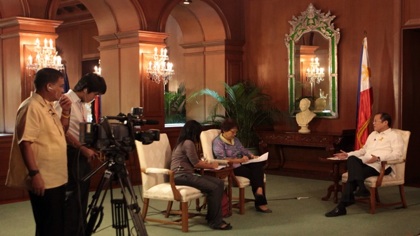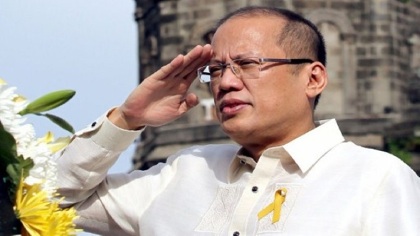SUMMARY
This is AI generated summarization, which may have errors. For context, always refer to the full article.

Below are excerpts from an exclusive interview of the author and Rappler’s Purple Romero with President Benigno Aquino III on June 1, 2012, two days after the conviction of Chief Justice Renato Corona. The interview was held in Malacañang Palace. The entire interview will be part of Marites Vitug’s forthcoming book on the Supreme Court whose working title is “Midnight in the Court.” As he enters his third year in office, the President shares his thoughts on reform, mortality, faith and the future.
Q: During the campaign, you were the first candidate to speak up against the midnight appointment. Was that instinctive? Did you feel that that was something you had to take a position on?
Aquino: I must assume that I read it somewhere, that particular constitutional provision. Then I got a copy of the Constitution and started reading it. Then that was it. The law was very clear to anybody with Grade 3 English. Our predecessor made the appointment [of the chief justice] one week after the elections. Not only that. Now, the Supreme Court has [made into law] this interpretation of the Constitution.
If the Supreme Court is the final arbiter, she [Gloria Arroyo] had a unique position of practically putting every member there. Remember I campaigned on a promise of change, that corruption will be stopped. If our predecessor orchestrated this corruption and she will not be put before the bars of justice and get the corresponding penalty, then the course of impunity continues. And this was such really a blatant attempt.
Q: If we look back at the impeachment, was there an educational value? How did it strengthen our democracy or institutions in the country?
Aquino: For the longest time, you had judges, justices who actually said “I am the law” by their actions. Now, what is the main lesson? You can be the chief justice but you are still accountable to the people. Our mechanisms may be tedious but they can work. If there is a will, they will work. If the people are already behind the moves toward changing the status quo, then it could happen.
I guess we saw a very concrete and real example of abuse. How do you overlook 98 percent of your assets and remember just the 2 percent? And force that to the people?
We all swear to defend and uphold the Constitution. The Constitution doesn’t give us a choice of whether or not to come up with a SALN. We are ordered to produce one, we are ordered to attest to the veracity of it under oath. We can be removed from office by violating the Constitution. We are not a dictatorship. We will go through all of the processes. We will protect everybody’s rights even of those that oppose us.
Q: What prepared you to do battle with the court? Was it something your mother told you, the way you were raised?
Aquino: I guess it starts with Martial Law. The day my dad got sentenced to death, I was 16 years old. Our world turned topsy-turvy. You had the entire machinery of the state against you. I was only incidental to this because of my parents but the state can still kill you. How bad was it? My mom would be walking on the sidewalk, then there would be a person whom they knew who [in the past] swore undying loyalty and would literally jaywalk to cross the other side of the street [to greet my mom] but was now afraid to be seen with her. We made so many adjustments. But more so when my dad got killed.
At the end of the day, my school prepared me with theology instructions, how do you fight an oppressive structure? You have to make your life as simple as possible. And my interpretation was: what are the levers? The levers are you’ll get incarcerated, or you’ll get killed. So I made a decision — what’s the point of living in a world wherein you will not rise because of your merits? Where right and wrong was exactly how it was portrayed in the film “1984” by George Orwell.
I was 12 years old when Martial law was proclaimed, I’m a student of history, when you look at the totalitarian regime, how do they get removed from office? Normally through bloody revolution. Those in the frontlines never get to see the end of the revolution. So expectations in one’s life change.
I didn’t expect to reach 30, honestly. I got ambushed in 1987, so all of this is bonus. I have not gotten a wife nor a family. It’s like God’s plan. Would I be as brave if I would be thinking of a child and a wife.
So when I accepted this latest chapter in my life, I went back to the same question that my Mom had; my mom always thought that she would just be helping to finish my Dad’s work. But when the clamor came and it was pointed to her that she was the unifying factor, and without her there, the guarantee of the Marcoses’ perpetuation in office… So I guess in a sense it’s really an opportunity, to finish the work. Finish the obligation. Now, we’re changing the status quo, we’re disturbing so many people’s rice bowls.
Q: What kind of leader would you like to appoint in the Supreme Court?
Aquino: Of course, someone who is respected by the members, somebody who can manage, somebody who’s acknowledged as learned in the law, who has a vision for the countrymen. In this whole [impeachment] process, we wanted the truth. With the truth, we move forward as a people; it’s not about whose interest versus whatever else’s group’s interest.

Q: What are the leadership lessons you’ve learned through all these difficult 4 1/2 months [of the impeachment process]? Maybe even earlier, in dealing with the Court?
Aquino: At the end of the day, I’m the head of the executive. I’m the chief executive of this country. The buck literally stops with me. So what does that mean? You can’t be anxious, angry. And that’s true, about being lonely at the top, literally true. There are days that we have apprehensions. Am I free to share these with anybody? Will it weaken the resolve of those at the frontlines with you? Will it change the outcome? Then you have to be transparent also so you need to balance.
Perhaps, that’s when the faith dimension comes in. You have a feeling that you can accomplish a hundred steps, but you’re still on the third, fourth or fifth step. How do you manage the rest of the 95?
Q: So you’re a spiritual person.
Aquino: Not to the extent that my Mom was. I’m more temporal.
Q: So do you receive a lot of pressure for this upcoming major decision [to choose a chief justice]?
Aquino: With all these critics I have – and it has become an industry – should I still pay attention to them? Whatever I do, I’m still wrong. Why waste your time? When I visited my parents [on October 31], there was this old lady, who approached me, and the message was: don’t think about what the media say, just think about us. At the end of the day, did people’s lives change? Did it change for the better? Are they apathetic or optimistic? Are they empowered, whether they are young or of my age; people who are older, are the opportunities really open for everybody, are we moving forward?
If there’s pressure I feel, I don’t want to boast, but I measure it in terms of what promises I’ve fulfilled. And my greatest regret will be to let down their expectations.
I will be remiss if I don’t train a successor or for that matter if we pin our hopes on only one person or group. Nothing will happen to us. So I was hoping we will institutionalize this. Our party is the oldest party in the country; we’re hoping we could make it an institution. We decide based on party, platform, ideology rather than personality. – Rappler.com
Add a comment
How does this make you feel?
There are no comments yet. Add your comment to start the conversation.